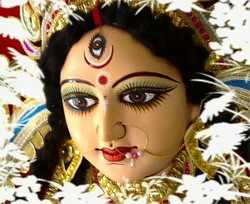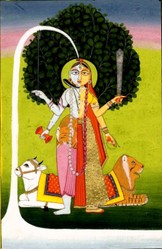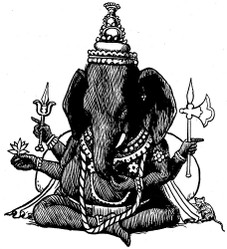In India, traditionally children started education around five years of age. Years back, this was possible. But in today's life, this is not practical and so we all start our kids education early. Among the Hindus, young children between ages of 2 to 3 years formally start their education on an auspicious day, mostly on the Vijayadashami day.
Either a priest or one of the parents usually help the child to write on a plate full of raw rice. Sometimes a grandparent, or someone else who is respectable may also do the function.
Either a stone pencil or a dried piece of fresh, dried turmeric is used to write on the rice. What the children write on the rice can vary depending on the region, but it will be definitely include prayers to the goddess Saraswati, Lord Ganesha and also other gods.
Goddess Saraswathi, one of the nine forms of the goddess, is seen as the goddess of education.
After writing on the rice, kids can write on papers or books. The function is known as Vidyarambham which can be translated as the beginning of education.
Two days prior to the Vijayadashami day, the prayers and celebrations intensifies and actually the last three days including the Vijayadashami day have more importance than other days. People usually displays small figurines or statues of different forms of gods and goddesses. These figurines are generally known as Golu.
The three days are considered very important for school going children too, as this is a time particularly related with prayers on education. Students may keep their books and study materials for worship and they are not expected to read or write on those three days. Schools usually remain closed for these three days.
On the Vijayadashami day, after the morning prayers are offered, the books can be taken back. In most of the places, all the little kids usually write prayers on either rice or papers, even though this is not mandatory.





 Beach Wedding Dresses - Exotic Wedding Gowns For Beach Theme Weddingson 12/24/2016
Beach Wedding Dresses - Exotic Wedding Gowns For Beach Theme Weddingson 12/24/2016
 Purple Wedding Dresses For Bride - Dresses For Purple Theme Weddingson 03/29/2016
Purple Wedding Dresses For Bride - Dresses For Purple Theme Weddingson 03/29/2016
 Ladies Purple Wedding Shoes | Purple Themed Wedding Shoes For Womenon 04/04/2016
Ladies Purple Wedding Shoes | Purple Themed Wedding Shoes For Womenon 04/04/2016
 Unique Gifts For Horse Lovers - Unique Horse Themed Gifts For Kids & Adultson 12/16/2016
Unique Gifts For Horse Lovers - Unique Horse Themed Gifts For Kids & Adultson 12/16/2016



Comments
The word "navam" means nine in Malayalam language too, and I believe it is the same in Sanskrit and many other Indian languages. Similarly the word "dasam" denotes ten in many Indian languages. But these are not words that we usually use while talking to someone.
It is interesting that Latin has similar words!
Reading through this I spotted some patterns in the words: navrati [nine nights] The Latin for nine is novem [quite similar.] Dussehra [tenth night. ] The Latin for ten is decem [again similar] No wonder the Romans who visited India saw similarities between their Latin language and Sanskrit.
Thanks WriterArtist. I love to do the fasting sometimes(never did for navratri yet) , but I can't imagine doing it along with the housework! I used to fast while I was in the office, though.
My mother used to fast at Navratri and I wonder how she could do all this in addition to her job and house work. We celebrate Navratri with beautiful decorations here with our neighbours, call them and distribute sweets.
Thanks pateluday!
Thanks Derdriu, I agree. Starting education on an auspicious day is a great idea!
Very Good write up and informative as well.
VioletteRose, Thank you for sharing information about this festival.
The idea of starting education on an auspicious day is endearing: such a wonderful idea!
Thanks Frank, I am happy to share what I know.
Some people across the world know of some Hindu festivals, but there are many of which we have not heard. I have studied the Hindu philosophical and religious schools, but my knowledge of festivals has lagged behind. So when you are explaining Hindu festivals you are performing a valuable educational task. Keep up the good work